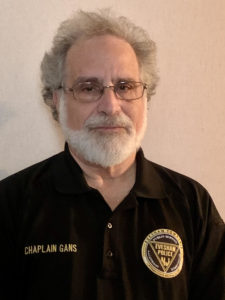
By Steve Lipman
On a Saturday night after the end of Shabbat last month, Rabbi Gary Gans, emeritus spiritual leader of Congregation Beth Tikvah in Marlton, New Jersey, heard the distressing news of what had taken place earlier that day at another small synagogue in the United States.
A Pakistani-born terrorist entered Congregation Beth Israel in Colleyville, Texas, and held four people hostage until all four escaped, and FBI agents shot Akram to death.
Could that type of antisemitic incident happen in Marlton?
Gans was taking no chances.
The rabbi, 70, a Northeast Philadelphia native who has served the southern New Jersey synagogue since 1981, was concerned about the threat that “copycat” terrorists could pose to his own congregation.
He quickly sent an email to a lieutenant in his town’s police department.
“Within minutes,” Gans said, police patrols of his synagogue increased, and have continued, particularly while worship services and religious school classes are taking place inside.
Gans said his protection appeal succeeded because of the contacts — and the confidence — he built up among officers during his five previous years as a volunteer chaplain with the Evesham Police Department.
He knew the right person to call in an emergency; the lieutenant understood the rabbi’s concern.
“It was very confidence-inspiring to know that police were stationed outside our building,” said Rabbi Nathan Weiner, who succeeded Gans at Beth Tikvah. “Rabbi Gans’ ability to be in touch with the local PD so quickly gave us all reassurance and enabled us to more quickly alert our congregants to the thoughtful safety response of the congregation.”
Gans, who was ordained by the Reconstructionist movement and earned a Ph.D. degree in family counseling at the Eastern Baptist Theological Seminary, became a police chaplain when the police department approached several members of the local clergy to establish the chaplaincy program. He was attracted by the “sense of purpose … giving back to the community.”
To prepare for his post-pulpit assignment, he participated in a months-long training program and accompanied police on ride-along patrols.
Gans, who was on the other side of barricades from police decades earlier during anti-war demonstrations, said he gained new respect for the officers.
While Jewish chaplains in a big city’s police department in this country are common, they are rarer in communities home to few Jews.
Beth Tikvah, Marlton’s only Jewish house of worship, has some 250 member families. That means there are several hundred Jews in the congregation and maybe a few hundred unaffiliated Jews in a town whose population is 45,000. Though no one keeps official records of such matters, Marlton likely ranks among the municipalities with the smallest Jewish communities that have a Jewish police chaplain in its ranks.
Chaplains are trained to work with people of all faiths.
According to police department literature, its chaplaincy program is designed to “provide spiritual support for the community during traumatic events and incidents when called upon 24 hours a day, 7 days a week.” The chaplains “respond to counsel, assist and support victims and others touched by critical incidents and crises, including death notifications, suicide, homicides, hostage situations, kidnapping and other traumatic events,” and are “specially trained to handle crisis situations and also provide follow-up counseling, group debriefings and individual intervention.”
Police chaplains don’t wear uniforms but are issued official-looking, black police department shirts. While serving as a chaplain, Gans wears a homemade kippah that bears the police department logo.
As a chaplain, he’s on call 24/7; in a typical week, he’s called two or three times. As a Sabbath-observant Jew, he’s willing to drive on Shabbat to a scene that may involve someone’s mental or physical health.
His most memorable call?
He showed up at the home of a non-Jewish family. Someone had died there. In the living room, two people were sitting on a couch; a woman who was talking to another, older, woman seated next to her, holding a newspaper in her arms — the second woman, mother of the first, turned out to be the deceased. Her children, some of whom arrived soon, didn’t want the police to move or remove their mother’s body immediately; they wanted the honor of escorting her from the home.
The police agreed. They let the children place their mother on the gurney and wheel it to a vehicle outside.
Gans said he stood aside and let the children pay that final honor to their mother. “They were at peace.”
And the rabbi did what his rabbinical training had taught him to do. “I offered comfort.”
Steve Lipman is a former reporter with NY Jewish Week.






